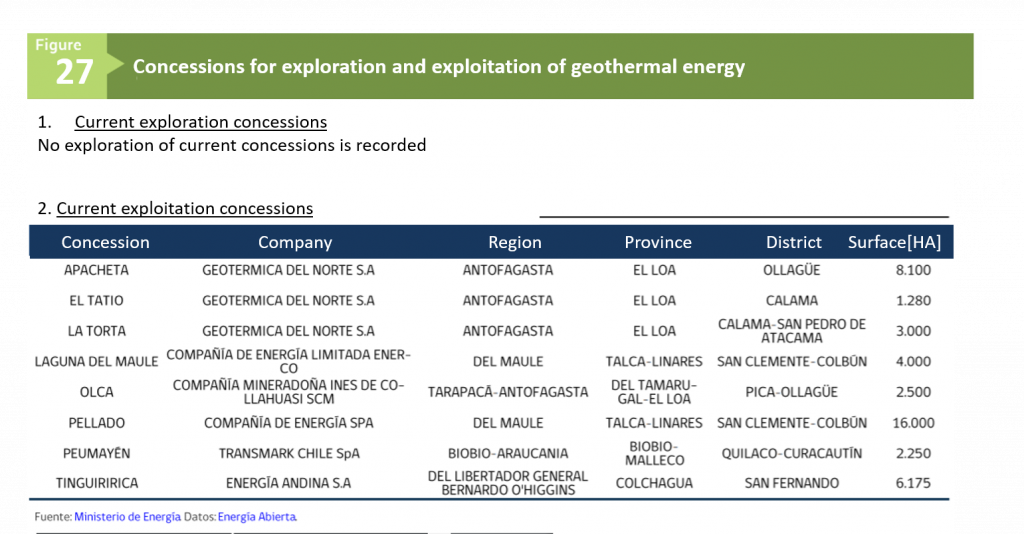4.8. Information platforms and resources available
Before the installation of a renewable generator in a certain place, the available energy resource must be appropriately evaluated. To this end, the State, in parallel with the development of the regulation for these projects, has made an effort to raise public and free information to reduce barriers to access. Likewise, the State has allocated large tracts of fiscal land for the development of renewable energy projects. In the particular case of geothermal energy, the State has authorized exploration or exploitation of geothermal energy in many areas of the country.
One of the pillars of the Program of Support to the Development of the NCRE carried out by the Ministry of Energy is the generation of public information on the natural resources present in Chile, which will guide, through an up-to-date background both to its development policy and to potential investors.
In this context, the Ministry designed tools such as “Exploradores de Energía”, which are designed to assess the energy potential of renewable resources in the country and also measurement campaigns for wind and solar resources in the country. In addition, it has implemented information platforms that allow the indirect evaluation of these resources by means of modeling tools, databases, territorial information and updated cadastre of the resources present in the country. All these platforms can be accessed through of the web site of the Ministry of Energy [30].
Details of the functionalities of these information platforms can be found in Annex 5.
In 2010, through a Framework Agreement of Collaboration between the Ministry of National Assets and the Ministry of Energy, areas for wind projects were reserved in the Great North, which are being granted in concession of onerous use for the development of wind projects by way of bidding public. The purpose of this initiative is to efficiently manage the fiscal wealth and respond to the growing demand for fiscal lands for such projects. Since that date onwards, there have been multiple tenders for land for non-conventional renewable energy, both wind and solar, and storage systems, specifically, until the year 2021, 40 bidding processes have been carried out, with 5259 MW in operational projects and 2447 MW in projects under construction.
The Ministry of National Assets has prioritized the development of NCRE projects in fiscal properties, located mainly in the country’s Great North. This is why the bidding procedure for the concession of use of fiscal land can be initiated by the Ministry, but also at the request of the interested parties [31]. In addition, in October 2020 the Ministries of Energy, National Assets and Corfo signed a collaboration agreement to promote green hydrogen projects in public lands to promote the development of said industry.
One of the tasks of the Ministry of Energy is the administration of Law 19.657 of 1999 on concessions of geothermal energy. Its functions are to grant and deny applications for geothermal concession, to make calls for tenders, when dictated by the Law and its Regulations[32]; And to resolve claims related to the concessions system, among other activities established by the law. It is also responsible for the study, formulation and execution of policies, instruments and regulatory proposals applicable to geothermal energy.
A geothermal concession is an administrative act granted by the State where it is authorized to carry out activities of exploration or exploitation of geothermal energy in a given area. Concessions of geothermal energy can be obtained through applications submitted directly to the Ministry of Energy or through calls for public tenders.
Figure 27 shows the concessions for exploration and exploitation of geothermal energy in force in December 2020.

Source: Ministry of Energy










